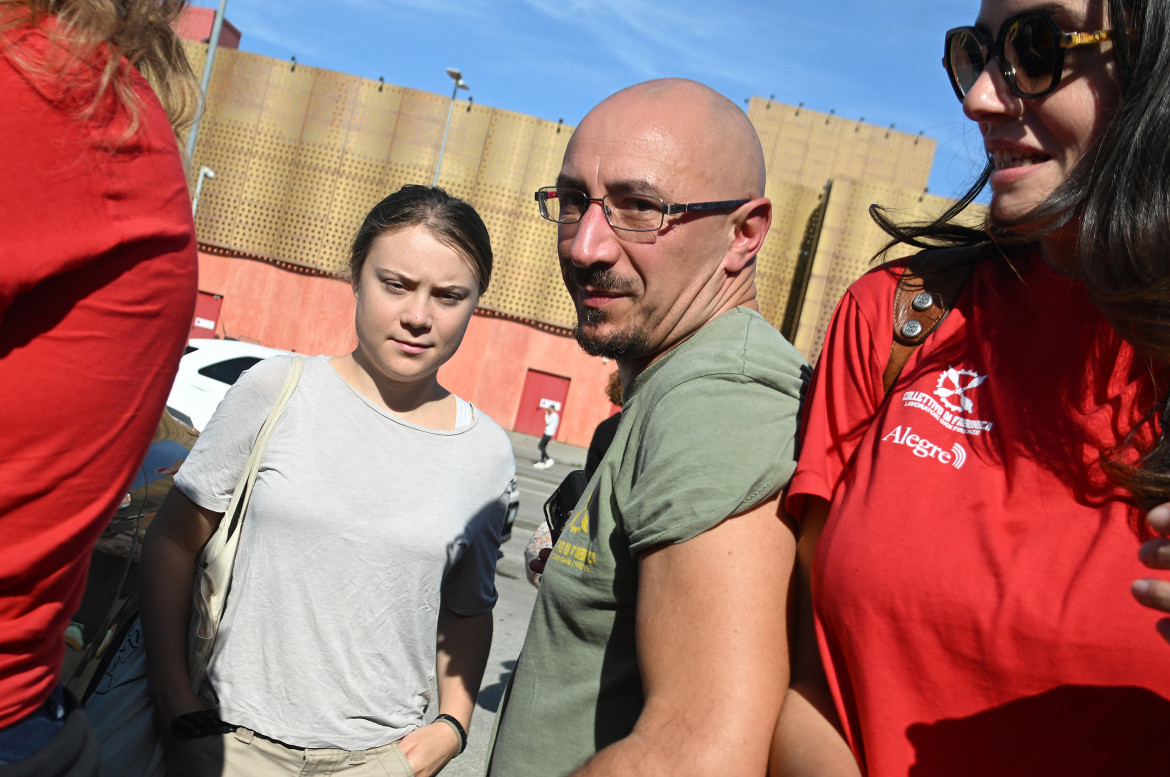Reportage
At an ex-GKN auto parts plant, the ecosustainable factory of the future
The “Greta effect” drew TV cameras to a three-day event, organized as a collective discussion on reindustrialization from the grassroots level in Florence, where workers are reindustrializing an old factory.

Sitting in the fourth row under a large double tent set up outside the former GKN car parts factory, Greta Thunberg listens intently to the speeches at the “convergence meeting” organized under the banner of the question: “Do we need an Estates General for climate and social justice?”
Thanks to a headset system and simultaneous translation by Daniela Chironi and Luca Conciamatti, the participants can speak both in Italian and English, as does a group of climate activists who have arrived from the UK. Three very young activists from Fridays for Future are moderating the discussion.
“Until the last moment, we didn't know if Greta would really come,” says Matteo Moretti, veteran union delegate of the former GKN factory. ”She decided to set out with friends from Fridays for Future in Milan after yesterday's demonstration.”
The “Greta effect” is certainly being felt, with TV cameras crowding a small press space where Moretti and fellow union delegate Dario Salvetti are talking to the media about this three-day event, organized as a collective discussion on reindustrialization from the grassroots level and climate justice, and also as an international meeting of popular shareholders. Their shareholding initiative has been very successful, with shares worth €1.3 million reserved by nearly 800 individuals and about 150 legal entities including NGOs, People's Houses and ARCI Circles, branches of ANPI and others.
“We want to reindustrialize this factory, also in order to remove it from the possible influence of the logic of real estate speculation and land consumption,” Salvetti explains. ”And today, we don’t see how else this can be done except through ecologically advanced production, like we have set out in our industrial plan. Clearly, this idea is supported by a vast international climate movement which – with the symbolic presence of Greta as well – is showing that the supposed conflict between labor and the environment has not only never existed as far as we are concerned, but is less and less of a reality everywhere. In a situation of crisis for entire industries, such as the automotive industry and even fashion, we believe that climate jobs, the jobs created by the climate transition, are the only solution.”
“Today, we are using direct democracy as a form and tool to reappropriate the possibility of reindustrialization, because here we have a factory without an industrial plan and, paradoxically, an industrial plan of our own without a factory. A situation that can only be explained by the speculative logic of real estate,” Salvetti adds.
What role has the political world played in all of this? “Politics is divided into three categories. There are those who openly oppose the idea of the grassroots reindustrialization of the former GKN plant. Then, there are those who support us, but on a time scale that is unworkable. It’s like when they say the operation was successful but the patient died. I want to remind you that we have been without pay for 10 months. Finally, there is a small part that supports us, and over the years has helped to create a community of solidarity that has led to results such as the popular shareholding initiative.”
Meanwhile, an elderly activist from Piedmont is speaking about the Novara region and the many dozens of now-abandoned industrial buildings, open wounds on a fertile land, which took the place of the rice fields and other crops that the area used to be known for. “I get involved with local committees that are trying to prevent further devastation, because we should always listen to the land, even though we only talk about it when there’s a drought or there are floods,” he concludes.
Then, British union delegates take the floor, praising the struggle of the former GKN workers to reopen their factory as “a ray of hope.” Afterwards, Eliana of Mondeggi Bene Comune – a successful initiative of occupying disused farmland that has been brought back to life – explains how their agro-ecology-based crops represent a possible solution in an industry that makes extensive use of both fossil fuels and water, and is affected by climate change more than any other. The Last Generation activists also make their presence felt, with Tommaso thanking the workers for what they’re doing: “We have decided that this future belongs to us, and we want to think about it together,” he concludes. Almost all the speeches end with the call to “Free Palestine.”
At the end, Greta takes a group photo with the workers and one of their projects: a prototype cargo-bike for transporting goods in historic city centers. On Sunday, after the popular shareholders’ meeting, the workers were set to join the anti-mafia demonstration in Seano, in the Prato district, called by the SUDD COBAS union after yet another violent attack with iron bars against a picket line of Pakistani workers exploited by Chinese companies producing ready-to-wear fashion.
Originally published at https://ilmanifesto.it/ex-gkn-la-fabbrica-ecosostenibile-del-futuro on 2024-10-13
